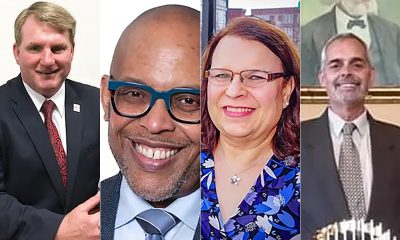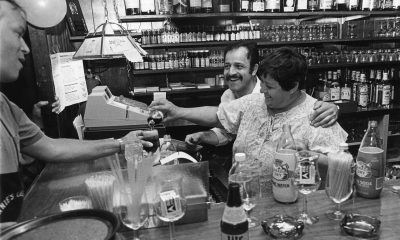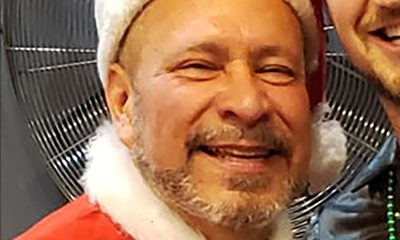Local
Bonds wins D.C. Council race
Silverman takes ‘gay’ precincts in special election
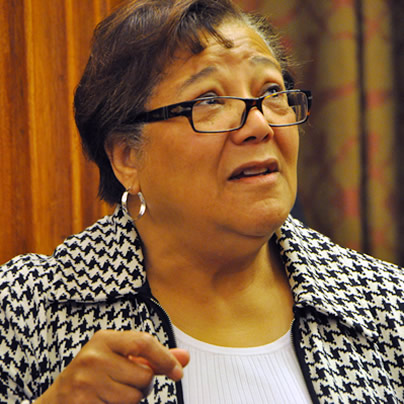
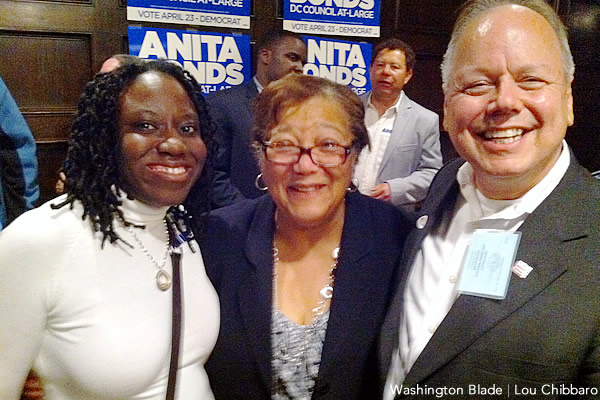
‘I know I have many friends in the LGBT community for which I am blessed,’ Anita Bonds (center) told the Blade after her win on Tuesday. Bonds pictured here with Lateefah Williams (left) and Bill O’Field. (Washington Blade photo by Lou Chibbaro)
Incumbent Democrat Anita Bonds won the race for an at-large seat on the D.C. Council in the city’s special election on Tuesday, beating five rivals, including pro-gay Republican Patrick Mara, who drew support from LGBT activists.
But Democratic candidate Elissa Silverman, who came in second place citywide, won in 12 of the city’s 14 precincts identified as having high concentrations of LGBT residents. Mara came in second in the same 12 precincts, with Bonds coming in third.
Bonds won by a wide margin in the two remaining “gay” precincts, one in Anacostia and the other along the Southwest waterfront area, where large numbers of black LGBT residents live.
“I know I have many friends in the LGBT community for which I am blessed,” Bonds told the Blade after delivering her victory speech at the Channel Inn Hotel located on the Southwest waterfront.
“I don’t know how they all voted, but when we look at the data we’ll probably discover that persons who have been members of the community 15 to 20 years, they knew Anita,” she said. “Those who are relatively new to D.C., many didn’t know me or know my record.”
David Meadows, former president of the Gertrude Stein Democratic Club, the city’s largest LGBT political group, serves as press secretary for Bonds’ Council office. He noted that Bonds became a member of the Stein Club as a straight ally in 1978, two years after the club was founded, and has been a strong LGBT rights supporter ever since.
“I wouldn’t say it was overwhelming,” Meadows said in describing Bonds’ support among LGBT voters in Tuesday’s election. “But I think that there were many long-term LGBT residents that understood the support that Anita Bonds brought to our community.”
In the citywide race, Bonds received 32 percent of the vote, with Silverman receiving 28 percent. Mara received 23 percent. Democratic candidates Matthew Frumin and Paul Zuckerberg received 11 percent 2 percent respectively. Statehood Green Party candidate Perry Redd also received 2 percent.
As predicted by many political observers, only about 10 percent of the city’s registered voters turned out to vote in the special election, appearing to be one of the lowest turnout elections ever in D.C.
Each of the candidates expressed strong support for LGBT rights, including backing for the city’s same-sex marriage law. Bonds and Silverman drew support from many of the city’s prominent LGBT activists.
Mara also drew support from some of the city’s prominent gay Democratic activists, raising speculation that he could win the race as a reform candidate appealing to Democratic voters, both gay and straight, who yearn for a fresh face on the Council.
But Silverman appears to have won over a majority of the voters that political pundits say Mara attracted in his two previous races for a City Council seat.
Silverman came in first in Wards 1 and 6, where large numbers of LGBT voters live. Mara won in Ward 2, which also has large numbers of LGBT residents, and in Ward 3, where the majority of the city’s registered Republicans reside. Silverman’s win over Mara in Ward 1 came as a surprise to some because Mara, a Ward 1 resident, won election last year to the Ward 1 seat on the city’s Board of Education.
Bonds won by wide margins in the majority black Wards 4, 5, 7 and 8.
Silverman received the most votes among members of the Gertrude Stein Club at an endorsement meeting in March. But she fell five points short of the 60 percent majority vote required for a Stein Club endorsement. Bonds came in second place in the endorsement vote.
Individual Stein Club members appeared to be evenly divided in their backing between Silverman and Bonds.
LGBT activists familiar with city voting trends caution that the so-called “LGBT” precincts may not be representative of all LGBT voters because most of them are in majority white sections of the city. Gay Democratic activist Phil Pannell, a longtime resident of Ward 8, has said black LGBT residents tend to be dispersed in many different precincts and tend not to be concentrated in a few specific precincts such as those in Dupont Circle, Logan Circle and Adams Morgan.
Following is the breakdown of the vote between the leading three candidates in voter precincts identified as having high concentrations of LGBT residents. Percentages are rounded:
- Precinct 14 (Dupont Circle): Silverman, 44 percent; Mara, 37 percent; Bonds, 6 percent
- Precinct 15 (Dupont Circle): Silverman, 43 percent; Mara, 39 percent; Bonds, 11 percent
- Precinct 16 (Logan Circle): Silverman, 46 percent; Mara, 32 percent; Bonds, 11 percent
- Precinct 17 (Logan Circle): Silverman, 36 percent; Mara, 34 percent; Bonds, 15 percent
- Precinct 18 (Shaw): Silverman, 40 percent; Mara, 18 percent; Bonds 24 percent
- Precinct 22 (14th & U Street, N.W. corridor): Silverman, 45 percent; Mara 31 percent; Bonds, 13 percent
- Precinct 23 (U Street & Columbia Heights): Silverman, 48 percent; Mara, 21 percent; Bonds, 17 percent
- Precinct 24 (Adams Morgan): Silverman 51 percent; Mara 20 percent; Bonds, 13 percent
- Precinct 25 (Adams Morgan): Silverman, 41 percent; Mara, 34 percent; Bonds, 8 percent
- Precinct 36 (Columbia Heights): Silverman, 45 percent; Mara, 36 percent; Bonds 20 percent
- Precinct 89 (Capitol Hill): Silverman 50 percent; Mara, 36 percent; Bonds, 4 percent
- Precinct 90 (Capitol Hill): Silverman, 47 percent; Mara, 36 percent; Bonds, 6 percent
- Precinct 112 (Anacostia): Silverman, 5 percent; Mara, 4 percent; Bonds, 78 percent
- Precinct 127 (Southwest Waterfront): Silverman, 29 percent; Mara 20 percent; Bonds, 39 percent
Maryland
Rockville teen charged with plotting school shooting after FBI finds ‘manifesto’
Alex Ye charged with threats of mass violence

BY BRETT BARROUQUERE | A Montgomery County high school student is charged with what police describe as plans to commit a school shooting.
Andrea Ye, 18, of Rockville, whose preferred name is Alex Ye, is charged with threats of mass violence. Montgomery County Police and the FBI arrested Ye Wednesday.
The rest of this article can be found on the Baltimore Banner’s website.
District of Columbia
New D.C. LGBTQ+ bar Crush set to open April 19
An ‘all-inclusive entertainment haven,’ with dance floor, roof deck

D.C.’s newest LGBTQ+ bar called Crush is scheduled to open for business at 4 p.m. on Friday, April 19, in a spacious, two-story building with a dance floor and roof deck at 2007 14th St., N.W. in one of the city’s bustling nightlife areas.
A statement released by co-owners Stephen Rutgers and Mark Rutstein earlier this year says the new bar will provide an atmosphere that blends “nostalgia with contemporary nightlife” in a building that was home to a popular music store and radio supply shop.
Rutgers said the opening comes one day after Crush received final approval of its liquor license that was transferred from the Owl Room, a bar that operated in the same building before closing Dec. 31 of last year. The official opening also comes three days after Crush hosted a pre-opening reception for family, friends, and community members on Tuesday, April 16.
Among those attending, Rutgers said, were officials with several prominent local LGBTQ organizations, including officials with the DC Center for the LGBTQ Community, which is located across the street from Crush in the city’s Reeves Center municipal building. Also attending were Japer Bowles, director of the Mayor’s Office of LGBTQ Affairs, and Salah Czapary, director of the Mayor’s Office of Nightlife and Culture.
Rutgers said Crush plans to hold a grand opening event in a few weeks after he, Rutstein and the bar’s employees become settled into their newly opened operations.
“Step into a venue where inclusivity isn’t just a promise but a vibrant reality,” a statement posted on the Crush website says. “Imagine an all-inclusive entertainment haven where diversity isn’t just celebrated, it’s embraced as the very heartbeat of our venue,” the statement says. “Welcome to a place where love knows no bounds, and the only color or preference that matters is the vibrant tapestry of humanity itself. Welcome to Crush.”
The website says Crush will be open Tuesdays and Wednesdays from 4 p.m. to 12 a.m., Thursdays from 4 p.m. to 2 a.m., Fridays from 4 p.m. to 3 a.m., Saturdays from 2 p.m. to 3 a.m., and Sundays from 2 p.m. to 12 a.m. It will be closed on Mondays.
Crush is located less than two blocks from the U Street Metro station.
District of Columbia
Reenactment of first gay rights picket at White House draws interest of tourists
LGBTQ activists carry signs from historic 1965 protest

About 30 LGBTQ activists formed a circular picket line in front of the White House Wednesday afternoon, April 17, carrying signs calling for an end to discrimination against “homosexuals” in a reenactment of the first gay rights protest at the White House that took place 59 years earlier on April 17, 1965.
Crowds of tourists looked on with interest as the activists walked back and forth in silence in front of the White House fence on Pennsylvania Avenue. Like the 1965 event, several of the men were dressed in suits and ties and the women in dresses in keeping with a 1960s era dress code policy for protests of the Mattachine Society of Washington, D.C., the city’s first gay rights group that organized the 1965 event.
Wednesday’s reenactment was organized by D.C.’s Rainbow History Project, which made it clear that the event was not intended as a protest against President Joe Biden and his administration, which the group praised as a strong supporter of LGBTQ rights.
“I think this was an amazing event,” said Vincent Slatt, the Rainbow History Project official who led efforts to put on the event. “We had twice as many that we had hoped for that came today,” he said.
“It was so great to see a reenactment and so great to see how far we’ve come,” Slatt said. “And also, the acknowledgement of what else we still need to do.”
Slatt said participants in the event who were not carrying picket signs handed out literature explaining the purpose of the event.
A flier handed out by participants noted that among the demands of the protesters at the 1965 event were to end the ban on homosexuals from working in the federal government, an end to the ban on gays serving in the military, an end to the denial of security clearances for gays, and an end of the government’s refusal to meet with the LGBTQ community.
“The other thing that I think is really, really moving is some of the gay staff inside the White House found out this was happening and came out to greet us,” Slatt said. He noted that this highlighted how much has changed since 1965, when then President Lyndon Johnson’s White House refused to respond to a letter sent to Johnson from the Mattachine Society explaining its grievances.
“So now to have gay people in the White House coming out to give us their respects and to say hello was especially meaningful to us,” Slatt said. “That was not expected today.”
Among those walking the picket line was longtime D.C. LGBTQ rights advocate Paul Kuntzler, who is the only known surviving person who was among the White House picketers at the April 1965 event. Kuntzler said he proudly carried a newly printed version of the sign at Wednesday’s reenactment event that he carried during the 1965 protest. It stated, “Fifteen Million Homosexuals Protest Federal Treatment.”
Also participating in the event was Japer Bowles, director of D.C. Mayor Muriel Bowser’s Office of LGBTQ Affairs. Bowles presented Slatt with a proclamation issued by Bowser declaring April 17, 2024, Mattachine Society Day in Washington, D.C.
“Whereas, on April 17, 1965, the Mattachine Society of Washington courageously held the nation’s inaugural picket for gay rights, a seminal moment in the ongoing struggle for LGBTQIA+ equality in the United States, marking the genesis of public demonstrations advocating for those rights and paving the way for Pride Marches and Pride celebrations worldwide,” the proclamation states.
About 30 minutes after the reenactment event began, uniformed Secret Service agents informed Slatt that due to a security issue the picketers would have to move off the sidewalk in front of the White House and resume the picketing across the street on the sidewalk in front of Lafayette Park. When asked by the Washington Blade what the security issue was about, one of the Secret Service officers said he did not have any further details other than that his superiors informed him that the White House sidewalk would have to be temporarily cleared of all people.
Participants in the event quickly resumed their picket line on the sidewalk in front of Lafayette Park for another 30 minutes or so in keeping with the 1965 picketing event, which lasted for one hour, from 4:20 p.m. to 5:20 p.m., according to Rainbow History Project’s research into the 1965 event.
Although the LGBTQ picketers continued their procession in silence, a separate protest in Lafayette Park a short distance from the LGBTQ picketers included speakers shouting through amplified speakers. The protest was against the government of Saudi Arabia and organized by a Muslim group called Al Baqee Organization.
A statement released by the Rainbow History Project says the reenactment event, among other things, was a tribute to D.C.-area lesbian rights advocate Lilli Vincenz, who participated in the 1965 White House picketing, and D.C. gay rights pioneer Frank Kameny, who founded the Mattachine Society of Washington in the early 1960s and was the lead organizer of the 1965 White House protest. Kameny died in 2011 and Vincenz died in 2023.
The picket signs carried by participants in the reenactment event, which were reproduced from the 1965 event, had these messages:
• “DISCRIMINATION Against Homosexuals is as immoral as Discrimination Against Negroes and Jews;”
• “Government Should Combat Prejudice NOT PROMOTE IT”
• “White House Refuses Replies to Our Letters, AFRAID OF US?
• “HOMOSEXUALS Died for their Country, Too”
• “First Class Citizenship for HOMOSEXUALS”
• “Sexual Preference is Irrelevant to Employment”
• “Fifteen Million U.S. Homosexuals Protest Federal Treatment”
-

 Africa4 days ago
Africa4 days agoCongolese lawmaker introduces anti-homosexuality bill
-

 District of Columbia1 day ago
District of Columbia1 day agoReenactment of first gay rights picket at White House draws interest of tourists
-

 World5 days ago
World5 days agoOut in the World: LGBTQ news from Europe and Asia
-

 Arizona1 day ago
Arizona1 day agoAriz. governor vetoes anti-transgender, Ten Commandments bill

